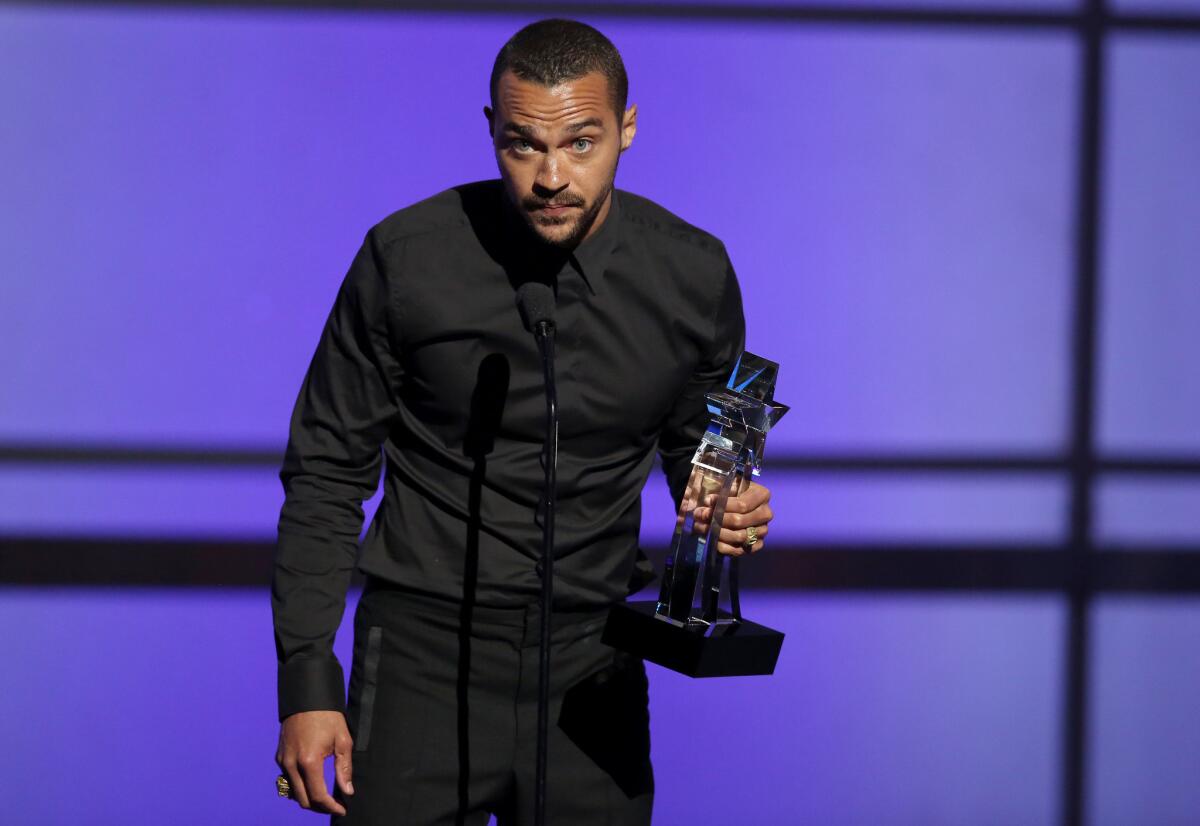Commentary: The social justice conversations behind Jesse Williams’ BET speech

- Share via
When “Grey’s Anatomy” actor Jesse Williams took to the BET Awards stage Sunday to accept this year’s humanitarian award, he stunned the Microsoft Theater audience and those watching at home with a passionate speech about, among other pressing issues, the Black Lives Matter movement. But while many are still reeling at the thought of a major actor using his platform in this decidedly political manner, his speech was not entirely novel.
A lot of the things Williams commented on have been said before by black political thinkers like the Rev. Martin Luther King Jr., as well as modern-day activists and artists.
But this does not take away from the fact that within his short speech, Williams presented an important distillation of some of the conversations happening about social justice today.
Williams brought up police brutality early, saying that police “de-escalate, disarm and not kill white people every day” but that black people are not afforded the same regard. In response, he said that the black community wants “equal rights and justice in our own country, or we will restructure their function and ours,” a nod to feminist scholar Audre Lorde’s 1984 essay, “The Master’s Tools Will Never Dismantle the Master’s House.”
“The master’s tools will never dismantle the master’s house,” Lorde wrote. “They may allow us temporarily to beat him at his own game, but they will never enable us to bring about genuine change. And this fact is only threatening to those who still define the master’s house as their only source of support.”
This essay has long been an inspiration for activists who call for the creation of a new system under which equality for all can be achieved -- because what’s in place privileges certain lives (rich, white, male, cisgender, heterosexual) over others.
Williams also showed impatience with people who criticize the methods of groups such as Black Lives Matter but are not themselves involved in the fight for equality. “If you have no interest in equal rights for black people, then do not make suggestions to those who do,” he said. “Sit down.”
Here he echoed the words of King’s 1963 “Letter From a Birmingham Jail,” in which King expressed why he was “gravely disappointed with the white moderate” who is “more devoted to ‘order’ than to justice … who constantly says ‘I agree with you in the goal you seek, but I can’t agree with your methods of direct action … .’”
“We’ve been floating this country on credit for centuries,” Williams continued, indicating that the early U.S. economy was largely built on the backs of slaves and their unpaid labor – a debt that has never been repaid. His mention of blacks being “taxed” also carried strains of the work of Ta-Nehisi Coates, whose essay “The Case for Reparations” outlines the destructive effects of redlining – withholding or raising the prices for services like bank loans or healthcare for discriminatory reasons – on black families.
But perhaps the weightiest statement Williams made came in a charge of cultural thievery, of “ghettoizing and demeaning our creations, then stealing them.” This has been the subject of debate particularly among young black users of social media, who often find that the same slang and cultural innovations that make them the subject of criticism in mainstream society suddenly become acceptable when they are co-opted into commercials for pancakes or cars.
He even had a phrase for this process: “Gentrifying our genius.”
Almost as if on cue, pop star Justin Timberlake tweeted out a message during the speech that was taken by many as condescending, when he told another user to “realize that we are the same.”
He was immediately criticized for both his own participation in what many see as cultural appropriation and his deflection of the purpose of the speech. He quickly apologized and said that he “felt misunderstood.”
But, as Williams intimated in his speech, sometimes conversations about race are uncomfortable. Or in his own words: “The burden of the brutalized is not to comfort the bystander. That’s not our job.”
FULL COVERAGE: BET Awards 2016 »
Twitter: @TrevellAnderson and @dexdigi
The complete guide to home viewing
Get Screen Gab for everything about the TV shows and streaming movies everyone’s talking about.
You may occasionally receive promotional content from the Los Angeles Times.




